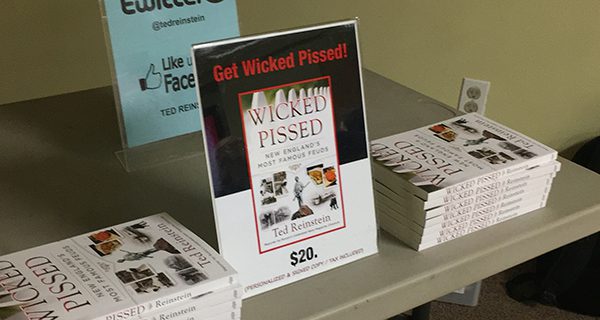[ccfic caption-text format="plaintext"]
By Katrina Margolis
Hometown Weekly Reporter
New Englanders are famous for a variety of things, including but not limited to our clam chowder, our driving, our fervent and arduous love for all of our sports teams, and now, our long-standing ability to hold a grudge. Ted Reinstein, a journalist and reporter for Chronicle, wrote his most recent book about this last aspect.
“Wicked Pissed: New England’s Most Famous Feuds” covers everything from sports to politics, food to finance, aviation to engineering. On May 9, Reinstein made an appearance at the Dover Public Library to talk about this book and what he chose to write about.
Some of New England’s most famous feuds are sports related, however Reinstein decided to include only one of these in his book. He chose “The Feud,” the one we all know well, and has been a source of incredible joy as well as unbelievable frustration: the rivalry between the Red Sox and the Yankees. There is no doubt that this is the most well-known feud in New England, and arguably in sports nationally.
However, many of Reinstein’s topics are lesser known. He wrote about the feud between the Bunker family and the Breed family. As many in this area know, the Battle of Bunker Hill did not actually take place at Bunker Hill, but took place at Breed’s Hill. For years afterwards, the recognition has gone to the Bunkers – the community college, the plaques, a racetrack in Indiana, and more. Needless to say, the Breeds are still pretty upset about it, something Reinstein learned when he spoke to the 13th generation of Breeds.
One of the major topics of the book circles around first flight. The story of Orville and Wilbur Wright is ubiquitous in American culture. However, in Bridgeport, Connecticut, two full years before the Wright brothers achieved flight, another man did. This man, Gustav Weisskopf, was an engineer. His plane achieved flight for longer than the Wright brothers, without the use of an elevated surface (the Wright brothers had to create a running start for themselves so to speak), and at an elevated height. Reinstein contemplated the reasons we don’t hear about Weisskopf, discussing the nuances of history and its recording. Many of the things learned in schools are because history was recorded by the winners, and Weisskopf, a German immigrant in a time of German animosity, was not a winner.
Reinstein’s book is fun and accessible, covering a number of topics that are not only interesting tidbits in today’s world, but may have very well shaped the New England we know today.

























